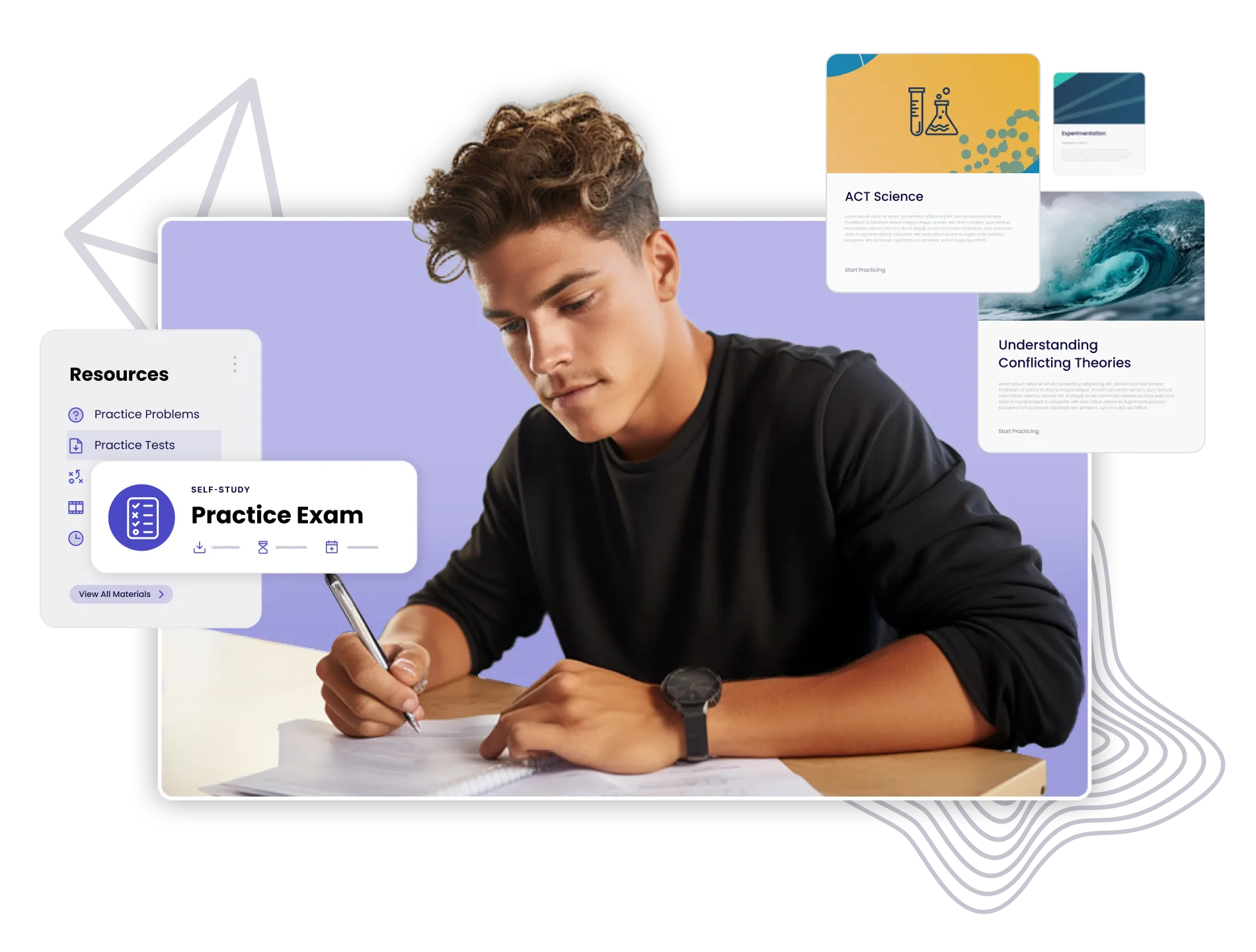What Colleges Want – And How To Give It To Them

College admissions are more competitive than ever, leaving high school students with lots of consternation about how to prioritize their time and how to know what truly matters to admissions offices. Fortunately, you can do a lot better than guess. Varsity Tutors regularly partners with top admissions officers and admissions consultants for the inside word on how to succeed in the application process. And according to former Harvard senior admissions officer Devery Doran, there are three dimensions of applicant analysis. In this article, we’ll break down all three dimensions along with tips for how you can maximize your candidacy in all three.
Did you know?
Varsity Tutors Learning Members have access to live events, video recordings, and podcasts hosted by former admissions officers to provide insight into every aspect of the admissions process.
Dimension 1: Academic Rigor, Success, & Intellectual Curiosity
The most important component in your college application is related to academics. Which makes sense: above all else, you’re going to college to learn. And what colleges want to see is that you can do the work; you’ll take learning seriously and take advantage of learning opportunities; and ultimately you’ll graduate and be successful.
So what does that look like on an application? Colleges want to see you take challenging classes, get high grades, and post competitive standardized test scores. Which should seem both logical and difficult: of course, they want you to get good grades in hard classes and ace tricky tests…but that’s easy to say and hard to do. Right? You do have some advantages, though, including:
1) Talk to your counselor, early and often.
How challenging do your classes and how high do your grades need to be? Since course offerings and grading scales can differ school to school, colleges rely in large part on reports from counseling offices that indicate how challenging your course load was compared to what’s offered and what your peers took, and how your grades stack up to students in similar classes. So your counselor knows what you need to do to be competitive–and how to organize your schedule to ensure that you have room to take the challenging classes you’ll need and enjoy. Have those conversations starting in 9th grade and revisit them yearly so that you don’t have to guess how you stack up academically and you don’t run out of time to take the classes that will impress admissions.
2) Stay on an upward trajectory.
Another academic factor that schools seriously consider is your trend: if you got more Bs than As as 9th grader but earned straight As in 11th grade, that’s a much better transcript than regressing from straight As to mostly Bs in 11th grade. So rest assured that there’s room to improve year by year, but also know that you can’t quite rest on your laurels from a successful sophomore year, either, since schools love that upward trend.
3) Take standardized tests, and take them seriously.
Speaking of upward trends, the importance of SAT and ACT scores in admissions has been increasing ever since the test-optional craze that was largely born of the Covid era. Even at schools that are officially “test-optional,” students with high test scores (those at or above the school’s median) get in at significantly higher rates than those who don’t report scores. And colleges continue to show data suggesting that test scores are highly correlated with collegiate success; a recent University of Texas study found that students admitted with test scores had, on average, a higher GPA by 0.86 points, prompting a return to a standardized test requirement. So don’t lean on test optional just because you “don’t want to” take the test; give yourself a shot at a high score and put in the work to earn one.
4) Outsmart them by outworking them.
Hard classes + high grades is a tough combination to pull off, but you have a secret weapon that really isn’t so secret: put in the work. The school year and school day are limited to a certain number of days and hours, but you don’t have to stop making progress when your classmates and teachers take a break. Use the summer to refresh your precalc skills so that you don’t start AP Calculus already rusty. Start an AP study group in February or March so that you’re ready for the exam in May. Work with a tutor or afterschool group before you get behind so that you always stay ahead. Hard classes, by definition, aren’t supposed to be easy, so success favors those who put in a little extra effort.
5) Be curious.
This dimension includes “intellectual curiosity” for a reason: remember, colleges are looking to see if you can do college-level academic work and if you’ll want to do that work. Your transcript is just one way to show them that the answer is yes–you can join academic competitions or clubs, pursue summer programs or independent research, and
Dimension 2: Extracurricular Leadership & Impact
Students and parents often ask: is it better to be involved in a lot of things, or focused and really good at one? And the answer, predictably, is “both”–but with an important lean toward the latter. And here’s why. For one, admissions officers care a lot about extracurricular involvement because they’re building a campus community that they want to be vibrant and interactive. Deep extracurricular involvement shows that a candidate is passionate and committed and likely to bring those qualities to campus organizations and relationships. They want people who leave places and teams better than they found them. And secondly, the most selective schools have more than enough applicants with similarly-excellent grades and test scores, so they’re looking for candidates who stand out from a crowded pack. At a top 200 school with a >50% acceptance rate, being president of a club or captain of a team is enough to stand out; at a top 25 school that admits less than 20% of applicants, you have all the more need to stand out and those titles alone tend to blend in.
So view your extracurriculars in three levels: involvement, leadership, and impact.
- Involvement means you were on the team, did the projects, or participated in the events. Just about every applicant should be involved in a handful of activities, which don’t have to be school-sponsored groups. Church and community groups count, as do after-school jobs and independent pursuits like art and coding projects.
- Leadership means you had a distinguished role: perhaps you were an officer of a club, had a lead role in a play, or won some local/regional awards. Among all the people who did the activity, your peers, supervisors, or judges chose you as elite among them. Particularly as a 9th or 10th grader, it’s helpful to look at the extracurricular activities you’re involved in and ask yourself where you have a path to leadership, because successful applicants to schools with acceptance rates around 50% or less tend to have some leadership roles.
- Impact means you did something that truly stands out: perhaps you won a state-level competition, or founded and grew an organization, or performed some unique and impactful research. Importantly, this is hard and unique! Not every high school student can claim this level of impact. But at schools that admit less than 25% of an already-competitive applicant pool, impact is an important way to stand out from that pack.
So as you assess your extracurriculars, remember to seek out activities that give you a chance at higher-level involvement through leadership and impact. You may find that by starting your own organization or project or by looking outside of the activities your school provides.
Dimension 3: Personal Qualities
When schools assess applicants, they’re cognizant that they’re not just admitting a student but also someone’s roommate, lab partner, and teammate. So in addition to “excellence” on transcripts and in extracurricular activities, they’re looking for qualities that suggest that that student–and the people they live and work with–will have an excellent experience.
These qualities primarily show up in your essays, letters of recommendation, and interviews (if your schools conduct them), and it’s important to be deliberate about which qualities you want schools to see in you. Keep in mind: you have a fairly limited word count in your essays, so if it’s important to you that schools see you as curious, or hard-working, or compassionate, or whatever you see as a winning quality in yourself, you choose essay topics that showcase those qualities. Otherwise, how would they know?
Even long before you sit down to write application essays, you can start working toward Personal Qualities in a few ways:
- Identify your recommenders. One of the best ways for personal qualities to shine is if a teacher is the one to brag about them for you. But for that to happen, you have to have teachers who have seen those traits in you and with whom you’ve built enough of a relationship that they’ll write a more heartfelt letter than a general template. So find teachers whose classes you enjoy and tell them that. Ask questions and genuinely seek to learn and understand. Say hello in the hallway. Forge the relationships that lead to winning letters.
- Prepare your recommenders. In a given semester you may have 6 or 7 teachers. Your teachers may have well over 100 students. So if you want a teacher to provide a particular example or speak to a certain quality, ask them! Recommenders tend to like having a one-page primer reminding them who you are, what you were like in class, and what you’re hoping they can speak to in a letter. And since teachers get very busy in a new school year, if you can approach them in the spring of 11th grade so that they have time over their summer to write, they'll appreciate that too.
- Gather evidence. Whatever qualities you want to showcase to schools, your essay cannot simply be a list of them (“dear admissions officer: I’m smart, I’m handsome, I’m funny, I’m humble…”). They need to come through in story form as you answer one of the essay prompts about a topic that fascinates you, a time you faced adversity, a period of personal growth… So think about the qualities you believe to be true of you and keep track of events that show those qualities off. And if you don’t have many good examples, think of ways you can challenge yourself or immerse in fascinating topics or otherwise create situations where those qualities will shine through so that you have plenty of fodder for excellent essays.

